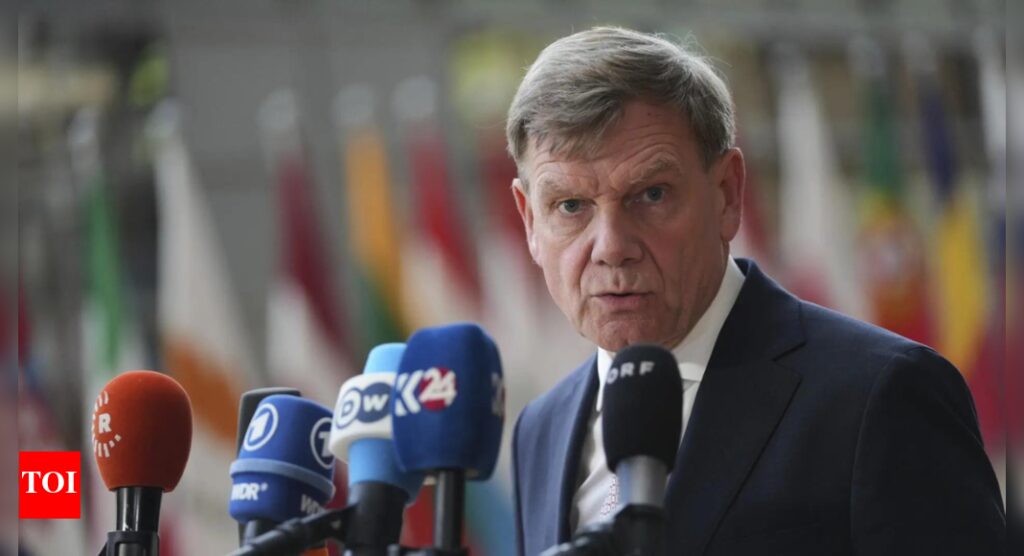Germany vows continued support of Israel as FM visits Berlin

Israeli foreign minister Gideon Saar met with his German counterpart, Johann Wadephul, in Berlin on Thursday.The meeting took place a day after Wadephul promised that Germany would send more arms to Israel despite growing international calls for a weapons embargo.Speaking at a press conference with his counterpart, Saar, Wadephul criticized Israel’s actions in the Gaza Strip.The German minister said he had renewed his “urgent request to allow humanitarian aid to Gaza” without restrictions as required by international law.Wadephul also decried the Israeli government’s announcement that it would allow 22 more settlements in the West Bank. He said that the German government “rejects” the creation of new Israeli settlements there as illegal under international law.Meanwhile, Saar appealed to Germany to give a chance to an alternative foundation to distribute humanitarian aid in the Gaza Strip.The Gaza Humanitarian Foundation (GHF) is controversial because it is supported by Israel and the United States. It circumvents United Nations aid agencies and other initiatives, and it has been accused of endangering civilians in the process.“This effort has the potential to free the Palestinian population from Hamas’s stranglehold and end this war,” Saar said, adding that this type of distribution could prevent Hamas from appropriating the aid.Hamas is recognized as a terrorist organization by the German government, the EU, the US and some Arab states.
Wadephul reiterates Germany’s support for Israel:
However, Wadephul stressed that Israel has a right to defend itself against Hamas and other enemies, and that “therefore Germany will of course continue to support Israel with arms deliveries, that was never in doubt.”Wadephul also said that recognizing a Palestinian state now would send “the wrong signal,” adding that negotiations between Israel and Palestine must conclude before a Palestinian state is recognized.He added that the European Union should maintain its pact governing political and economic ties with Israel, which was placed under review last month due to the situation in Gaza.Thursday’s meeting was the second official meeting between the two ministers. The first took place on May 11 in Israel.During Saar’s visit to Berlin, dozens of demonstrators protested Israel’s actions in the Gaza Strip. The protests began in front of the German Foreign Ministry in the morning under the slogan “Red Line of International Law.”Participants waved Palestinian flags and carried banners with slogans such as “No support for war crimes in Gaza,” “Stop the arms deliveries,” and “Stop the deliberate starvation of the people of Gaza.”
Ministers commemorate the victims of the Holocaust:
Earlier in the day, the two top diplomats laid a wreath at Berlin’s Holocaust Memorial, which commemorates the 6 million Jews killed in Europe under Germany’s Nazi regime from 1933 to 1945.“The fight against antisemitism, standing up for Jewish life in Germany and the commitment to the security and peaceful future of the state of Israel is and will remain our obligation, Wadephul said as he laid a wreath at the memorial in central Berlin with Saar. The memorial “reminds us Germans to remember the victims, to honour the survivors and to learn the lessons from the crimes against humanity of the Shoah,” he added.For his part, Saar said that 80 years after the end of the Holocaust, “the lessons seem to have been forgotten.” “In Germany, there’s an antisemitic incident once every hour,” the Israeli minister said, referring to a report published by a monitor on Wednesday. Wadephul said he was “deeply ashamed” that anti-Semitic offenses in Germany have reached a new high.
Wadephul’s apparent reversal on arms deliveries for Israel:
Wadephul’s promise of more arms deliveries to Israel on Wednesday came as an apparent reversal of comments made to the German daily Süddeutsche Zeitung last week.There, he suggested that further arms shipments to Israel were dependent on a government review of whether Israeli actions in Gaza complied with international humanitarian law.Israel launched its offensive in the Gaza Strip in response to raids led by the Palestinian militant group Hamas in southern Israel on October 7, 2023, in which some 1,200 people, mostly civilians, were killed and some 250 hostages were taken.The country is now coming under increasing international pressure to stop its military operation in view of the desolate humanitarian situation in the Palestinian territory. Gazan health authorities estimate 54,000 people have been killed.





